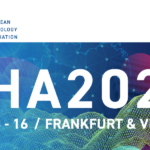
Director, Radiation Therapy Center, Fudan University Affiliated Cancer Hospital
The 2023 European Lung Cancer Congress (ELCC) is taking place in Copenhagen, the capital of the fairy tale kingdom of Denmark. On the first day of the conference, a session of oral presentations showcased the Phase II randomized study data on EGFR-TKI combined with local consolidative therapy for treating EGFR mutant metastatic non-small cell lung cancer (NSCLC) . Dr. Zhengfei Zhu from Fudan University Affiliated Tumor Hospital provides commentary on these research findings.
The study included patients with EGFR-TKI-naive metastatic EGFR mutant (19del or 21L858R) NSCLC or patients with NSCLC who developed the T790M mutation after frontline treatment. Patients received 6 to 12 weeks of osimertinib induction therapy. Patients without disease progression (according to RECIST 1.1 criteria) were randomly assigned in a 1:1 ratio to receive either osimertinib monotherapy (80mg once daily) or osimertinib in combination with local treatment until disease progression. The primary endpoint was progression-free survival (PFS), and safety was one of the secondary endpoints.
Between 2018 and 2022, 122 patients (median age: 65 years, range: 30-88 years) were randomized, with 63 patients in the osimertinib group and 59 patients in the osimertinib plus LCT group. Among the 59 patients who received local treatment, 35 received radiotherapy alone, 17 underwent surgery alone, and 7 received surgery plus radiotherapy. The median follow-up time was 16 months (range: 2-49 months).
– No grade 4/5 adverse events occurred in the entire cohort. The rates of grade ≥3 adverse events were 15.9% in the osimertinib group and 28.8% in the osimertinib plus LCT group (P=0.08), with no statistically significant difference. Common grade 1-2 adverse events in the osimertinib plus LCT group included fatigue, diarrhea, dyspnea, cough, pneumonia, dysphagia, and esophagitis.
– The most common grade ≥3 adverse events in the osimertinib monotherapy group were hyponatremia (4.8%), elevated transaminases (4.8%), and pneumonia (3.4%), while in the combination therapy group, the most common grade ≥3 adverse events were hyponatremia (6.8%), diarrhea (3.4%), empyema (3.4%), and pneumonia (1.7%).
Patients Receiving Radiotherapy in Combination with TKI Treatment:
-Among the 42 patients who received radiotherapy, one experienced a possible grade 3 adverse event related to radiotherapy. Treatment-related adverse events (TRAE) mainly included pneumonia (Grade 1: 2.3%, Grade 2: 11.9%, Grade 3: 2.3%), esophagitis (Grade 1: 7.1%, Grade 2: 2.3%), and dyspnea (Grade 1: 28.5%, Grade 2: 2.3%).
Patients Undergoing Surgery in Combination with TKI Treatment:
– Among the 24 patients who underwent surgery, three experienced surgery-related grade 3 adverse events (one arterial injury, two empyemas).
Dr. Zhengfei Zhu’s Commentary:
While EGFR mutant NSCLC patients can benefit from EGFR-TKI treatment, the issue of resistance is inevitable. EGFR-TKI resistance can be divided into primary and acquired resistance. Primary resistance refers to the lack of benefit from EGFR-TKI treatment, while acquired resistance occurs when patients initially respond to EGFR-TKI treatment (tumor regression, delayed progression, symptom improvement, etc.) but later experience disease worsening. The reasons for acquired resistance include molecular biology changes and phenotypic transformations, among others. In cancer treatment, a common scenario is that after treatment, the tumor shrinks to a certain extent but then stops responding to the drug. This may be because the remaining tumor cells are not sensitive to the drug being administered. These residual cancer cells may continue to shed and grow in other tissues, forming metastatic lesions, or they may grow in the original location, leading to local progression of the primary lesion. Tumor heterogeneity is one of the main reasons for drug resistance, and this heterogeneity increases during tumor evolution and treatment, affecting the tumor’s responsiveness to treatment modalities, often resulting in poorer efficacy of subsequent treatments.
So, can other treatment modalities delay resistance to targeted therapy, thus extending the effective duration of targeted therapy? The longer the duration of targeted therapy, the greater the probability and proportion of patients who can receive further treatment in the future. This is the background of the 2023 ELCC study (Abstract 2O), which explores the addition of local treatments such as radiation therapy and surgery to residual lesions after patients have achieved objective responses or disease stability with TKI drug therapy. Timing the addition of radiation therapy when the lesions are minimal may yield the best results, and it may maximize the protection of normal tissues. Foreign scholars have conducted several studies on EGFR-TKI combined with local treatment, and domestic scholars have also initiated a series of research studies based on this approach. We are currently exploring key issues such as the protocol and timing of TKI combined with radiotherapy.
The 2023 ELCC study is a randomized phase II clinical trial with an excellent design and concept. In this report, the focus has been on toxicity, and the preliminary results indicate that the adverse effects of combining osimertinib with local treatment can be tolerated. However, the most crucial aspect is efficacy, although toxicity remains an indispensable part of the evaluation. Adverse effects of the 1st, 2nd, and 3rd generation EGFR-TKIs often include interstitial lung disease, and the combination with radiation therapy may potentially lead to more severe lung injuries. Currently, there is limited research data available on this aspect.
From the perspective of the 2023 ELCC study, pneumonia remains a significant concern, with the incidence rate in the osimertinib plus radiation therapy group being approximately 16.5% (Grade 1: 2.3%, Grade 2: 11.9%, Grade 3: 2.3%). In the future, it will be essential to explore the impact of various radiation therapy techniques, different EGFR-TKIs, and the treatment response (PR vs. SD) on patient prognosis. We look forward to the release of efficacy data from this trial. If the phase II clinical trial can demonstrate that adding local treatment at the optimal time of targeted therapy improves short-term and even long-term effectiveness, further randomized phase III clinical trials with larger sample sizes can be conducted in the future to further evaluate the concept of combining EGFR-TKI with local treatment.


